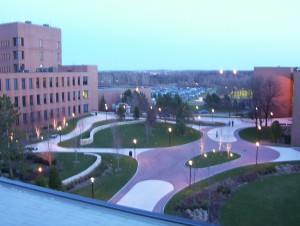UR and the Rochester Institute of Technology have decided to join forces with the formation of a new joint master degree in medical informatics.
The new degree brings together the strengths of the UR School of Medicine and Dentistry and RIT’s B. Thomas Golisano College of Computing and Information Sciences. Both schools are nationally recognized for their extensive research in medicine and computer science, respectively.
“The new joint degree program between UR and RIT represents the best kind of collaboration,” provost and executive vice president Ralph Kuncl said in a UR Medical Center press release. “It is a meeting of the minds between two programs with complementary missions in an area which itself represents a blend of information science, computer science and health care.”
The University and RIT have been discussing the joint degree for the past five years.
Initially, David Krusch, a surgeon and the Director of the Medical Informatics program at URMC, has served on an advisory committee at RIT to discuss converting their bachelor of science degree in biomedical computing to a bachelor’s degree in medical informatics. Since then, the focus of negotiations has turned toward creating a joint degree between the two universities.
Although UR and RIT have collaborated in the past, URMC’s Public Relations and Communications representative Leslie Orr assures that this one stands out from the rest.
“There are other joint degree programs, but we believe ours is unique, in the sense that those who graduate from this program are graduates of both universities,” Orr said. “Back in the ‘80s, RIT/NTID and UR collaborated on a program to prepare education specialists for the deaf at the secondary level, but that was primarily a UR degree, allowing RIT students to complete the coursework.”
In light of ObamaCare, which provides incentives for hospitals and medical organizations that create and use the most recent forms of information technology, the collaboration appears to be suitable.
The program is designed to prepare students from both medical and technology disciplines for the Obama era’s transition towards electronic health records.
“Most health care professionals do not have the computing expertise that is necessary to operate, understand and take advantage of the benefits that this technology offers,” Nicholas Thireos, the coordinator of both RIT’s undergraduate and graduate medical informatics program, said. “And many in the computing discipline lack the requisite knowledge of the medical field.”
With unique courses like Development and Deployment, Practice of Health Care, Economics of Software Development, and Clinical Information Systems, students will gain a multi-disciplined knowledge of the ever-changing landscape of medicine and information technology.
Some students were unfamiliar with the discipline prior to the news of UR and RIT’s collaboration. Since familiarizing herself with the new program, Public Health and African American Studies major and junior Vicky Baudin is convinced that the health informatics field is much needed.
“It seems effective and it will allow services to be more efficient,” Baudin said.
The universities are looking to enroll 12 students in the first year of the program and eventually expand to 30 in the following year.
Nathaniel is a member of the class of 2011.

